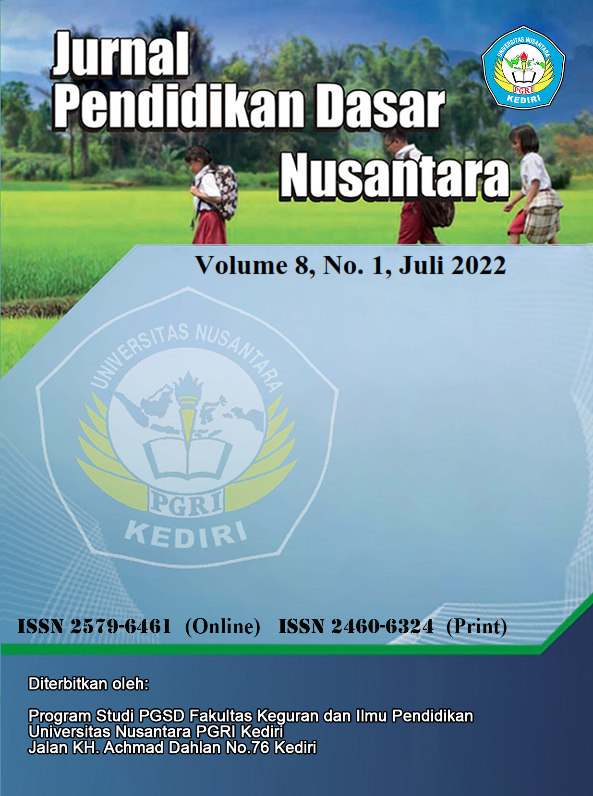INTRODUCTION TO SCIENTIFIC PUBLICATIONS FOR PGSD STUDENTS OF PGRI RONGGOLAWE UNIVERSITY THROUGH TECHNOLOGY LITERATURE IN INDONESIAN COURSES
DOI:
https://doi.org/10.29407/jpdn.v8i1.17729Keywords:
pengenalan publikasi ilmiah, Mahasiswa PGSD, Literasi TeknologiAbstract
The aim of this study is to describe the ability to identify scientific publications through technological literacy including, the ability to access scientific articles, select scientific articles, and develop scientific articles that have 76 class PGSD, class of 2018. This kind of study is a class action study. The data collection used is a questionnaire for data ability to access and select scientific articles, while the documentation techniques for data ability to compile the scientific article so, data analysis USES a quantitative descriptive technique. Research shows that, while the ability to access scientific articles before Indonesian subjects, 201% of students understand how to access scientific journals while 79.9% do not understand access to them and that percentage is equal to the ability to access scientific articles. 16.3% understand the menu in scientific journals while 83.7% do not understand the journal’s menu, 29.6% understand how to keep journal links where as 70. 4% do not understand an increase occurred 100% after technology-literacy breeding in Indonesian subjects. Studies of the ability to select a scientific article before Indonesian subjects are: 100% PGSD students cannot distinguish between research and non-research artists do not use science as referral for college work, and use referrals from sites other than scientific journals and after the technology-literacy experience of an Indonesian course there is a 100% increase. Next, the science where 20 students score 72, 19 score 70, 14 students score 7, 12 students score 73, 3 score 75, 3 more with 78, 2 score 76 and 2 score 77, and 1 student scores 69.
Downloads
References
Anindyarini, A., Sumarwati, S., Waluyo, B., Hastuti, S., & Mujiyanto, Y. (2019). Strategi Menghidupkan Budaya Literasi Melalui Dongeng. SENADIMAS, 253–258. https://ejurnal.unisri.ac.id/index.php/sndms/article/view/3257
Aristya, V. E., & Taryono, T. (2021). Prinsip Penting Publikasi Ilmiah dan Pencegahan Falsifikasi Fabrikasi. Refleksi Edukatika: Jurnal Ilmiah Kependidikan, 11(2), 178–189. https://doi.org/https://doi.org/10.24176/re.v11i2.5348
Astini, N. K. S. (2019). Pentingnya Literasi Teknologi Informasi dan Komunikasi bagi Guru Sekolah Dasar untuk Menyiapkan Generasi Milenial. Prosiding Seminar Nasional Dharma Acarya, 1(1), 113–120. https://stahnmpukuturan.ac.id/jurnal/index.php/dharmaacarya/article/view/194/187
Astuti, E., & Isharijadi, I. (2019). Pengenalan Open Journal System (OJS) untuk Publikasi Ilmiah Mahasiswa. Jurnal Pengabdian Pada Masyarakat, 4(4), 409–414. https://doi.org/https://doi.org/10.30653/002.201944.189
Darmalaksana, W., & Suryana, Y. (2018). Korespondensi dalam Publikasi Ilmiah. Jurnal Perspektif, 1(2), 1–8. https://doi.org/http://dx.doi.org/10.15575/jp.v1i2.10
Darmuki, A., Hariyadi, A., & Hidayati, N. A. (2021). Peningkatan Kemampuan Menulis Karya Ilmiah Menggunakan Media Video Faststone di Masa Pandemi COVID-19. Jurnal Educatio FKIP UNMA, 7(2), 389–397. https://www.ejournal.unma.ac.id/index.php/educatio/article/view/1027
Ernawati, E. (2011). Perilaku Pencarian Informasi dan Kemampuan Mahasiswa Menulis Pendahuluan Penelitian: Studi Kasus Mata Kuliah Chinese Scientific Writing. Humaniora, 2(2), 1182–1192. https://doi.org/https://doi.org/10.21512/humaniora.v2i2.3169
Fayza, A. A., & Nugraha, D. M. (2021). Pengaruh Literasi terhadap Perkembangan Pembelajaran PKN. Harmony: Jurnal Pembelajaran IPS Dan PKN, 6(1), 57–65. https://doi.org/https://doi.org/10.15294/harmony.v6i1.46506
Fitryarini, I. (2016). Literasi Media pada Mahasiswa Prodi Ilmu Komunikasi Universitas Mulawarman. Jurnal Komunikasi, 8(1), 51–67. https://doi.org/10.24912/jk.v8i1.46
Harahap, N. J. (2019). Mahasiswa dan Revolusi Industri 4.0. ECOBISMA (Jurnal Ekonomi, Bisnis Dan Manajemen), 6(1), 70–78. https://doi.org/https://doi.org/10.36987/ecobi.v6i1.38
Helaluddin, H. (2019). Peningkatan Kemampuan Literasi Teknologi dalam Upaya Mengembangkan Inovasi Pendidikan di Perguruan Tinggi. PENDAIS, 1(01), 44–55. https://uit.e-journal.id/JPAIs/article/view/218/366
Ismail, I., & Elihami, E. (2019). Pelatihan penyusunan Artikel Publikasi Ilmiah Bagi Mahasiswa Perguruan Tinggi STKIP Muhammadiyah Enrekang. Maspul Journal of Community Empowerment, 1(1), 12–20. https://ummaspul.e-journal.id/pengabdian/article/view/271/131
Juraman, S. R. (2014). Pemanfaatan Smartphone Android oleh Mahasiswa Ilmu Komunikasi dalam Mengakses Informasi Edukatif. Acta Diurna Komunikasi, 3(1).https://ejournal.unsrat.ac.id/index.php/actadiurnakomunikasi/article/view/4493/4022
Listiana, Y., Prastiwi, L., & Amrullah, I. (2021). Pendampingan Publikasi Ilmiah bagi Mahasiswa FKIP Universitas Dr Soetomo. INTEGRITAS: Jurnal Pengabdian, 5(1), 122–134. https://doi.org/https://doi.org/10.36841/integritas.v5i1.877
Masitoh, S. (2018). Blended Learning Berwawasan Literasi Digital Suatu Upaya Meningkatkan Kualitas Pembelajaran dan Membangun Generasi Emas 2045. Proceedings of the ICECRS, 1(3), 13–34. https://icecrs.umsida.ac.id/index.php/icecrs/article/download/1343/970
Pujiastuti, A. U., & Dwidarti, F. (2020). Pemahaman Mahasiswa PGSD UNIROW Tuban Tentang Teks Artikel Ilmiah. Journal of Teaching In Elementary Education, 4(2), 1–7. https://doi.org/http://dx.doi.org/10.30587/jtiee.v4i2.2240
Salam, R., Akhyar, M., Tayeb, A. M., & Niswaty, R. (2017). Peningkatan Kualitas Publikasi Ilmiah Mahasiswa dalam Menunjang Daya Saing Perguruan Tinggi. Jurnal Office, 3(1), 61–65. https://doi.org/https://doi.org/10.26858/jo.v3i1.3463
Siahaan, H. E. R. (2018). Refleksi Konsep Proto Logos Lukas dalam Membangun dan Meningkatkan Kegiatan Publikasi Ilmiah di Lingkungan Sekolah Tinggi Teologi. BIA’: Jurnal Teologi Dan Pendidikan Kristen Kontekstual, 1(2), 138–152. https://doi.org/https://doi.org/10.34307/b.v1i2.61
Simaremare, Y., Pribadi, A., & Wibowo, R. P. (2013). Perancangan dan Pembuatan Aplikasi Manajemen Publikasi Ilmiah Berbasis Online pada Jurnal SISFO. Jurnal Teknik ITS, 2(3), A470–A475. https://doi.org/10.12962/j23373539.v2i3.5163
Trianto. (2012). Pengantar Penelitian Pendidikan Bagi Pengembangan Profesi Pendidikan Dan Tenaga Kependidikan. Prenada Media Group.
Wahidin, U. (2018). Implementasi Literasi Media dalam Proses Pembelajaran Pendidikan Agama Islam dan Budi Pekerti. Edukasi Islami: Jurnal Pendidikan Islam, 7(02), 229–244. https://doi.org/http://dx.doi.org/10.30868/ei.v7i2.284
Downloads
Published
Issue
Section
License
Authors who publish with this journal agree to the following terms:
- Copyright on any article is retained by the author(s).
- The author grants the journal, the right of first publication with the work simultaneously licensed under a Creative Commons Attribution License that allows others to share the work with an acknowledgment of the work’s authorship and initial publication in this journal.
- Authors are able to enter into separate, additional contractual arrangements for the non-exclusive distribution of the journal’s published version of the work (e.g., post it to an institutional repository or publish it in a book), with an acknowledgment of its initial publication in this journal.
- Authors are permitted and encouraged to post their work online (e.g., in institutional repositories or on their website) prior to and during the submission process, as it can lead to productive exchanges, as well as earlier and greater citation of published work.
- The article and any associated published material is distributed under the Creative Commons Attribution-ShareAlike 4.0 International License

































